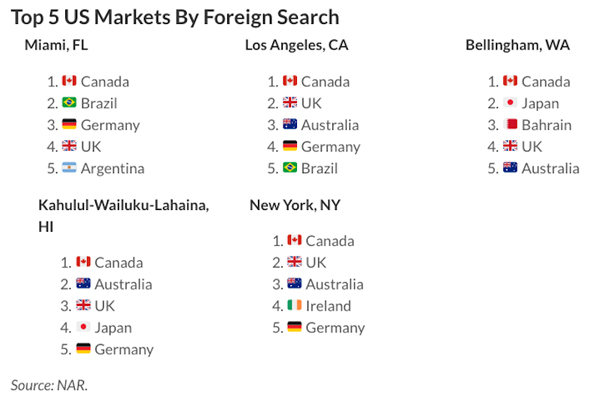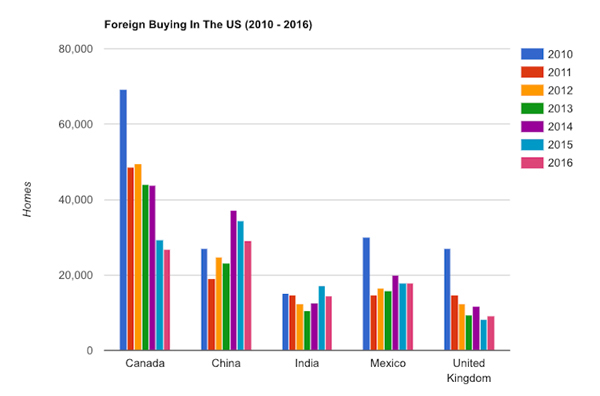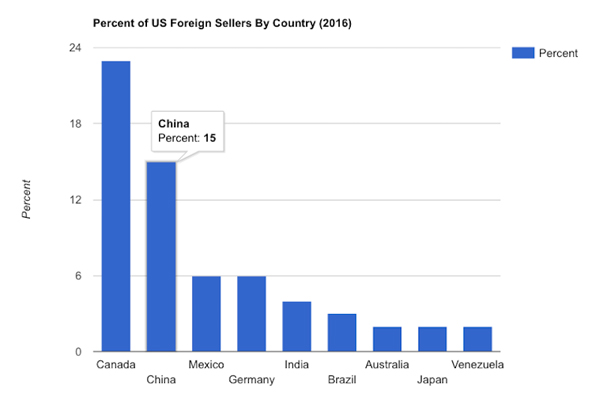Mainland Chinese buyers disappeared after China’s new capital controls were rolled out. Despite the lack of capital being exported, anecdotal evidence has been appearing in US media to the contrary. This “evidence” often quotes Juwai inquiries from 2016, before the new controls. Now we finally have a 2017 data point, from a much larger organization, the National Association of Realtors (NAR).
NAR March 2017 data from Realtor.com show Chinese buyers were absent from the list of top countries. Another country did top the list for almost every city though, Canada. Judging from Canadian buying behaviour from 2016, these aren’t snowbirds looking for a warm place to winter either. These are good ole fashioned, non-resident speculators.
Top Markets By Search In 2017
According to NAR, the top 5 markets foreign buyers are searching for are Miami, Los Angeles, Bellingham (WA), Kahului-Wailuku-Lahaina (HI), and New York City. All of those markets reported being hot spots for Chinese buyers in 2016. As of March 2017 though, China wasn’t even in the top 5 countries searching these locations. Instead Canadians topped the list for each one of those cities. In fact, Canadians topped the list for all 20 of the top markets, with the exception of El Centro, California – where they came in second.

Canadians Are More Likely To Be Non-Resident Buyers
NAR stats show that Canadian and UK buyers are the most likely to buy property for occasional use. Going back to 2016, 80% of Canadian, and 61% of UK buyers were non-resident buyers. To contrast, only 39% of Chinese buyers were non-resident. This means Canadian and UK citizens are more likely to buy property and not move into it. Whereas 61% of Chinese buyers are likely to buy property for relocation.
To understand how impressive this statistic is, you have to look at the relative number of people. China has over 1.317 billion people, and Chinese citizens purchased 29,195 US homes in 2016. That results in 11,386 US homes sold to Chinese citizens for investment or occasional use. To contrast, Canada has 35.85 million people, and Canadian citizens bought 26,851 US homes in 2016. Since 80% of Canadians are non-resident, that’s 21,480 homes for investment or occasional use bought by Canadians just last year.

Note, before you say they’re all resort homes – only 31% of Canadians bought in “resort” areas. The lion’s share of buying was in suburban America, where 38% of Canadians bought.
Canadian Vs. Chinese Speculators For American Property
One of the most interesting stats on US foreign buyers is the type of housing bought. In 2016, Chinese buyers were the largest by dollar volume, pumping in an estimated US$27 billion into US real estate. Canadians were a distant second, spending over US$8.9 billion. Despite the massive gap in dollar volume, Canadians purchased almost the same number of homes. The average Chinese buyer spent US$936,615, while the average Canadian buyer spent US$332,072. The average American spends just over US$271,000 on a home. This means Americans are more likely competing with Canadians than Chinese buyers.

Canadians Are Also Cashing Out
Last year Canadians were also busy realizing profits in the US. Citizens of Canada accounted for 23% of all sales from foreign owners in 2016, the highest of any single country. China was second, but way below at only 15%. Tied for third were residents of the UK, and Mexico with 6% of sales each. So it’s clear Canadians aren’t buying these properties to hand-down to their family, they’re buying them to make a profit.
This data doesn’t tell the whole story, but it does help us pull early details on a post-China real estate market. Speculative demand from China is a hot button issue, but it’s clear Canadians have the same obsession with real estate. Now that China has cracked down on exporting capital for property, will attention turn to Canadian speculators? Or is the issue to most people who is buying, not why they are buying?
